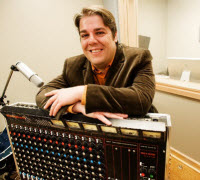 September 14, 2011 - Frank Russo, director of Ryerson's SMART (Science of Music, Auditory Research and Technology) lab, is able to delve into the mysteries of how people express their emotions, thanks to an ERA award funded by the Ministry of Research and Innovation.
September 14, 2011 - Frank Russo, director of Ryerson's SMART (Science of Music, Auditory Research and Technology) lab, is able to delve into the mysteries of how people express their emotions, thanks to an ERA award funded by the Ministry of Research and Innovation.Understanding how different senses contribute to the expression of emotion may lead to developing better therapies for those who have communication deficits, says a Ryerson University researcher.
Frank Russo is the director of the SMART (Science of Music, Auditory Research and Technology) laboratory. He is also one of two Ryerson scientists awarded the prestigious Early Researchers Award (ERA) by the Ministry of Research and Innovation this year so he can further his research in vocal emotional communication. (The other is Professor Habiba Bougherara, Department of Mechanical and Industrial Engineering).
"Increasing evidence suggests when you perceive emotion in communication, you are using your brain to simulate the observed emotion at an unconscious level," says Russo. "By engaging this neural-stimulation system, we are better able to understand what others are feeling."
Over the next five years, Russo and a team of 12 student researchers, from the undergraduate to post-doctoral level, will track the eye movements, facial muscles, tone/pitch and brainwaves of participants conveying emotion through song and speech. The patterns in tone and pitch of their voices will also be analysed to provide clues to any correlation with their facial and eye movements.
Song will be a big part of his research since Russo says that it tends to be a "purer" representation of an emotion such as anger or sadness.
"Songs are all about using emotions to communicate so it's helpful for us to study songs as an overt form of emotional communication to understand more subtle forms in speech."
Russo's current research in vocal emotional communication builds on his previous work, which examined perception of music through auditory and non-auditory channels. Most notable is his work in co-developing the Emoti-Chair with Ryerson Professor Deborah Fels, a chair-like device that enables hard-of-hearing and deaf people to "hear" music through vibrations.
"Whether it is the Emoti Chair or his current work on human emotion, Frank Russo is always ahead of the curve," says Jean-Paul Boudreau, Dean of Arts. "Russo is a leader in the field of vocal emotional communication, and the prestigious ERA award is just one example of the growing recognition of his stature in the science community."
Looking to the future, the psychology professor hopes that his research on vocal emotional communication will enable researchers to develop better therapies for those who have communication deficits.
"If we have a more complete understanding of how senses are integrated, this may lead to solutions for developing therapies for people who have communication deficits."
About the ERA program
Funded by the Ministry of Research and Innovation, the highly competitive program helps promising, recently-appointed researchers in Ontario build their research teams, drawing from a talent pool of undergraduate students to post-doctoral fellows. The program's goal is to improve Ontario's ability to attract and retain the brightest research talent.
Ryerson researchers receive up to $140,000 from the ministry and an additional $50,000 from the university over five years. Russo and Bougherara are among 71 emerging researchers and their teams at 19 institutions across Ontario who will have received a total of $10 million through the ERA program.
Ryerson University is Canada's leader in innovative, career-oriented education and a university clearly on the move. With a mission to serve societal need, and a long-standing commitment to engaging its community, Ryerson offers more than 100 undergraduate and graduate programs. Distinctly urban, culturally diverse and inclusive, the university is home to 28,000 students, including 2,000 master's and PhD students, nearly 2,700 faculty and staff, and more than 140,000 alumni worldwide. Research at Ryerson is on a trajectory of success and growth: externally funded research has doubled in the past four years. The G. Raymond Chang School of Continuing Education is Canada's leading provider of university-based adult education. For more information, visit www.ryerson.ca.
Taken from www.ryerson.ca/news/media/General_Public/20110914_MR_ERAFrank.html.

